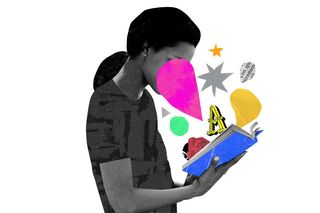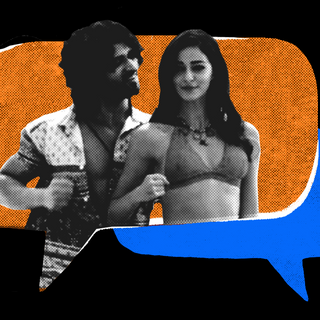
Can Reading Fiction Early in Life Make People More Empathetic?
Reading fiction can help people in seeing the world from the perspective of others and understanding its complexity.

“If I had a world of my own, everything would be nonsense.” Alice declared, halfway through her adventures in Lewis Carroll’s wonderland. “Nothing would be what it is, because everything would be what it isn’t. And contrary wise, what is, it wouldn’t be. And what it wouldn’t be, it would. You see?”
With Alice, we learned to embrace a chaos both familiar and unfamiliar to us. There was chaos of meaning — nothing made sense, but everything did. We tussled with the frontiers of logical reality, only to realize that the fiction of wonderland resembled a mad complexity of our real worlds too.
In its purest sense, the book changed our idea and perception of the world. And this poeticassociation appears to be the governing principle of fictional literature in general: reading, especially from a younger age, offers us a view world of the world that is complex. The diversity of meaning is further linked to making people compassionate and moreempathetic — almost as if narratives of imagination deeply alter something within us.
This link bears out in scientific research too. According to one studypublished in the journal Personality and Social Psychology Bulletin recently, exposure to fiction early in life makes people more conscious of taking the perspective of other people’s realities.
“Fiction, in other words, does more than just give people social practice—by presenting difference, novelty, and even confusion, it underlines the idea of the world as a radically complicated place,” said study author Nicholas Buttrick and colleagues.
Through fiction, readers are introduced to differences in the most vivid, compelling terms. And “even if that difference is not expressed as a different cast of mind, we argue that fictional experience can nevertheless remind readers that the world is complex, not simple; with powerful psychological effects,” the researchers added.Through a series of experiments, they showed that frequently reading fiction in younger years was associated with psychological richness, perspective-taking, and intellectual humility.
Related on The Swaddle:
There’s much to credit fiction for; it could heal societies. The connection goes beyond individualempathy;reading fiction is linked to a gradual decrease in violence over time, an increase in the tendency to vote, and even a rise in volunteering and charitable activities. It is no wonder the poet Denise Levertov surmised that fictional literature serves a social function of great literature, such that it awakens “sleepers by other means than shock.”
Aristotle illustrated centuries ago how fiction aids perspective-taking. When we watch tragedy, there are two emotions at play: pity for the character and fear that a similar fate may strike us. Imagination unfolds almost instinctively, where we react to the narrative, compare our situations, and even wonder how we, as individuals outside this manufactured world, would behave. He termed the emotional culmination of this as catharsis, a veritable exercise in shifting our perspective of others. “Just as pilots can practise flying without leaving the ground, people who read fiction may improve their social skills each time they open a novel,” Claudia Hammond also noted in BBC.
The power of fables and epics and fantasies draws partly from their ability to influence our empathy. In 2013, a study published in PLOS One linked this to something called the “transportation theory”: when we read fiction, we are emotionally transported into someone else’s world, absorbing their perspectives and fears and worries, treating them just like our own. And when we begin to identify with characters and internalize their lives, we consider their desires and aspirations more than our own, a 2016 research paper argued. The empathy reflects in our neural mechanisms too. When we read the word “kick,” the brain region associated with physical kicking becomes activated. The experiment showed how the distinction between real-life and fictional narratives fades in translation from reading to understanding.
This is also why fiction’s impact on empathy and perspective-taking is significantly more profound than any non-fiction piece of literature or media. “Specifically, it is easier to experience affect if a message presents information about a single, identifiable individual, than when information is presented about entire groups or using statistics,” argued authors of the 2016 paper. One can imagine themselves in the shoes of one, but never a thousand people. This could be because imagination gives people safety and solace to experience emotions, come to terms with structural inequality and oppression, and even challenge individual biases without feeling threatened.
The brain responds to fictional narratives too. Some experimental studies found that people who often read fiction were better at gauging other people’s thoughts, feelings, and emotions. Psychologist Diana Tami analyzed brain scans to find higher brain activity in regions responsible for simulating what other people think. And those who read fiction most often, the study found, had the highest social cognition abilities.
Arguably, this empathy and ability to frame the world in its abject complexity shapes not only our individual identities, but social and democratic identities too. Brilliant authors over the centuries have entrusted fictional literature, and the realm of reading, as those being “central to a healthy democracy” or even key to understanding the world and “participating in a democratic society.”
Arguably, my favorite reading of the benefits of fiction is how it wakes up people from the slumber of “almost-living.” And once awake, we see the world in a complexity that is both paralyzing and revolutionary.
Saumya Kalia is an Associate Editor at The Swaddle. Her journalism and writing explore issues of social justice, digital sub-cultures, media ecosystem, literature, and memory as they cut across socio-cultural periods. You can reach her at @Saumya_Kalia.
Related


In Conversation: On the Song Lyric That Aestheticizes Rape Culture
